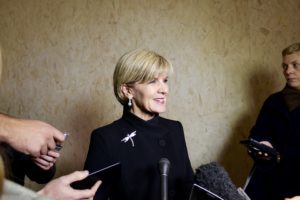Better Late than Never, Australia Ratifies the Paris Agreement
Su-Kim M | November 10, 2016.
The Australian government announced today that they have officially ratified the Paris Agreement, six days after it came into force. The announcement comes in the middle of COP22 where the implementation of the Paris Agreement will be discussed, and two days before Australia is to undergo the multilateral assessment process that all developed country parties must undertake to review their progress towards meeting their targets. Australia also announced its ratification of the Doha amendment to the Kyoto Protocol.
Australia’s delayed decision is indicative of a wider problem in Australian climate change policy, where the constant changing of Prime Ministers (there have been five different heads of government in the last six years) has seen environmental policy and climate action vary wildly from year to year.
Australian climate policy: 2009 to now
In 2009, then leader of the opposition (now Prime Minister) Malcolm Turnbull was replaced by Tony Abbott when the party fractured over Turnbull’s perceived support for a national emissions trading scheme that was proposed by the Rudd government.
In 2010, Julia Gillard replaced Kevin Rudd as prime minister of Australia and saw the narrow re-election of the labor party for a second term in federal government. Despite campaigning on how a carbon pricing mechanism would not occur under her leadership, Gillard announces a plan for a price in 2011, which passed through the parliament of Australia and came into force on 1 July, 2012.
However, when the Abbott government, who won power in the 2013 federal election, repealed the carbon price in September 2013. Throughout 2014 and 2015, funding available to renewable energy was reduced and restricted, and the Australian Renewable Energy Target was slashed after a deal was struck with the Australian Labor Party. In 2015, Malcolm Turnbull replaced Tony Abbott as prime minister, but Turnbull stated he would stick to the Abbott government’s agenda on all issues, including the environment and climate change.
Australia signed the Paris Agreement on April 22 2016, and under it has pledged to reduce emissions by 26 to 28 per cent of 2005 levels by 2030. However, as one of the world’s largest per capita emitters, Australia has come under pressure both nationally and internationally to strengthen their commitment.
Many hope that this be the first step in a permanent shift towards strong climate policy, leaving behind the days of confusing and constantly changing policy stances on climate change.
Being late to the party
Australia’s decision to ratify the Paris Agreement at COP22 was unsurprising to many after the recommendation that the agreement be ratified in the lead up to the conference. The actual timing of the decision is likely to see increased press coverage due to the topical nature of the decision during the conference. Having now ratified, Australia may see additional pressure during the negotiations to increase their commitments. During the multilateral assessment process on Saturday, Australia is expected to face a number of tough questions around its targets falling well below other countries with similar emissions profiles.
Dr. Simon Bradshaw, Oxfam Australia’s climate change advisor said that: “While ratification is a vital step and should be celebrated, the government is yet to do the math on what the agreement means for Australia and the scale of action we must take if we’re to do our part and help avoid a much more dangerous future.”
The ratification announcement provided some good news to the climate community in Marrakech attempting to ensure that all countries, including the United States, remain committed to strong climate action agreed upon in Paris. Despite the close relationship between Australia and the US, Turnbull has provided assurances that Australia will not pull out of the Paris Agreement even if Trump were to withdraw the US as part of a campaign promise made earlier in 2016, saying that “when Australia makes a commitment to a global agreement, we follow through, and that is exactly what we are doing”.
While this is unlikely to change Australia’s role, it sends a signal to the climate community that the country is committed to action in a time where stability and unity is important.
The Climate Institute’s deputy CEO Erwin Jackson analyses the situation: “Given the political events in the US in the last 24 hours, Australia’s ratification sends a message to the international community about our national intentions. This provides us with a level of credibility to be able to join other nations in encouraging other countries, particularly in our region, to implement the Agreement as well”.














comment